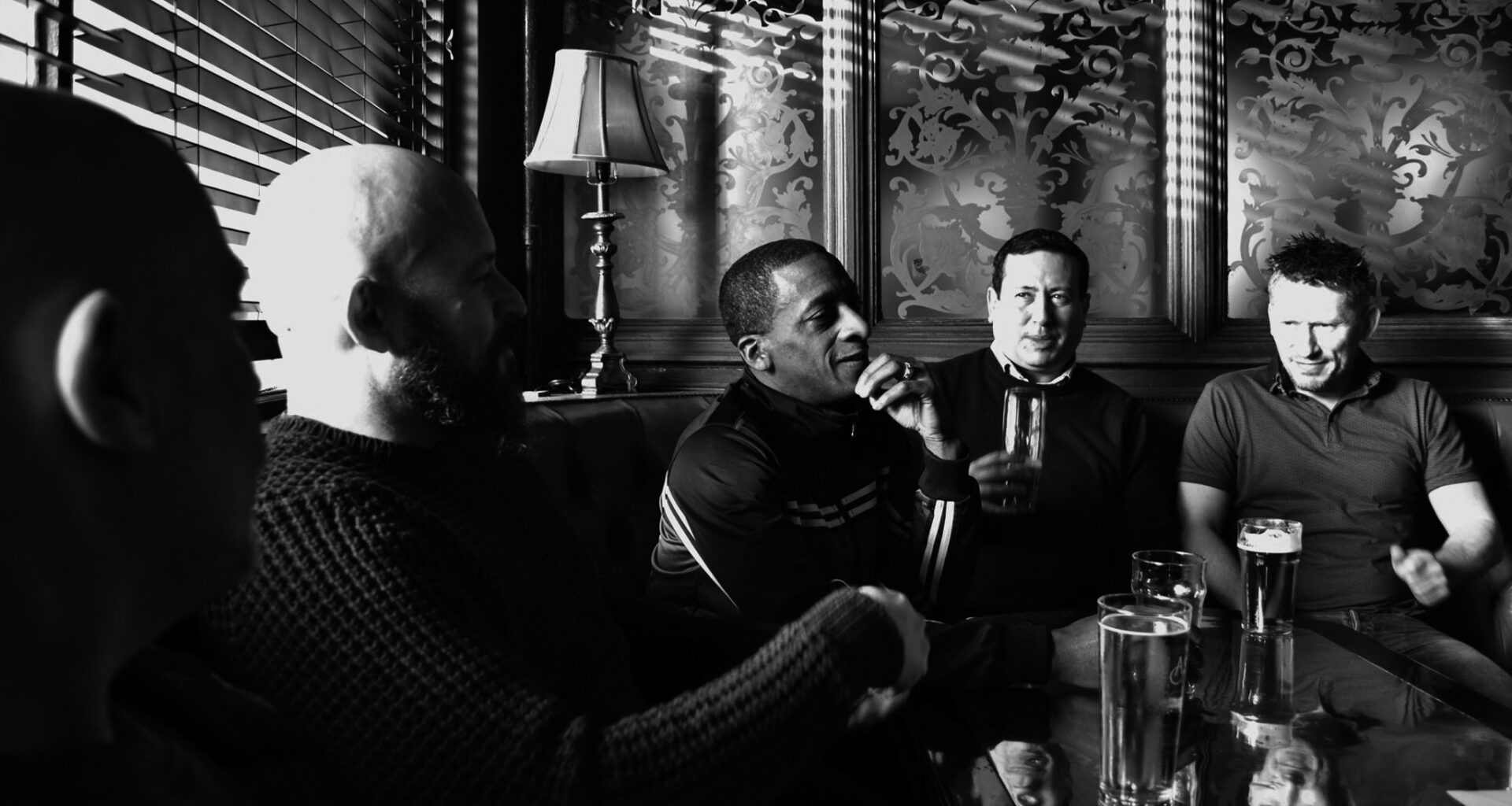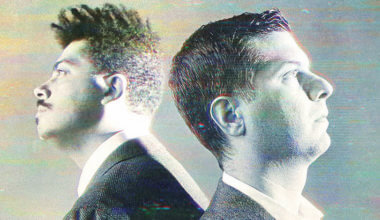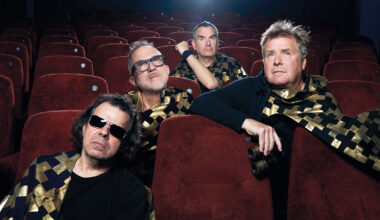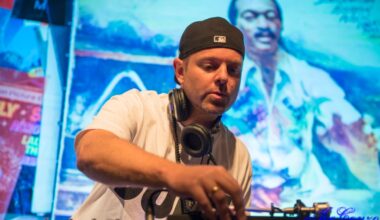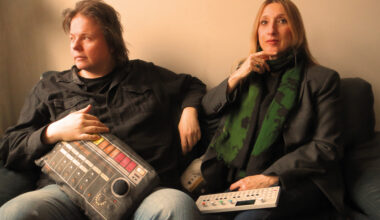Think Altern-8, Unique 3, Forgemasters, LFO and Krush. The bleep sound of Sheffield spawned an entire genre, not to mention its own label, Warp. Now the makers of many of those original tunes have mobilised once again as The Originators…
“There are many imitators, but we are the true creators, we are back.”
These bold words heralded the return of LFO back in 1991, in the intro to their second single, ‘We Are Back’, the follow-up to the Yorkshire duo’s chart-smashing eponymous debut single. Fast forward to 2017 and these words now fit, perhaps even more perfectly, with the arrival of Sheffield supergroup The Originators.
Between them, The Originators have been behind many of the names synonymous with the birth of the British techno scene. There’s Edzy, whose Unique 3 single ‘The Theme’ was pivotal in the fast-moving development of the “bleep” sound. They were synonymous with Warp Records, even though they weren’t, strictly speaking, even on the label.
Winston Hazel was part of pioneering Warp act Forgemasters and also the DJ who fused hip hop, techno, electro and house at the early Jive Turkey parties. Those landmark events at Sheffield’s City Hall ballroom also saw Gez Varley take the bleep sound to the masses with LFO. He broke the mould both as a live act and also by bringing the genre into the realm of the studio album with the classic ‘Frequencies’.
Mark Archer also lurks among the ranks, the man whose boiler-suited, face-masked image became the image of rave when Altern 8 took the charts by storm. Finally, Mark Gamble completes the roll call; the man not only behind bleep legend Rhythmatic and house act Krush (see the big-selling anthem ‘House Arrest’), but more crucially an engineer at Sheffield’s hugely influential FON studios.
Assembling such a veritable crop of talent under one banner might seem like a task of Herculean proportion, but Edzy shrugs off the suggestion with typical modesty ans understatement when we catch up with him in a central London hotel during a brief sortie to the capital.
“Since the bad old days, Facebook has arrived so you’re in contact with people constantly,” says the prodigiously-bearded Edzy. “It took 10 minutes and a few phone calls and that was it. We had a plan.”
He explains that the original idea for the supergroup (although that particular term isn’t one he uses) was to form an act that could go out live, with an awesome setlist of classic tunes. They do, after all, know each other well from the (g)olden days.
“It was an idea from a long time ago, probably from when I played BangFace at the Glade festival in 2006,” he explains. “I bumped into Mark Archer, who I love dearly and is a fantastic man. We spent the night around the campfire talking nonsense. When you get a little older you realise there are people you haven’t seen for a while who you probably ought to see. Mark has always been one of those people.
“Winston from Forgemasters is someone I’ve always thought highly of, and I already have a long-standing relationship with Mark from Krush because we have a studio together. I remember bumping into Gez a long long time ago; he’s a lad that grew up probably seven or eight miles away from me, so this idea of pulling people together who’ve been through the same kind of thing started to form.”
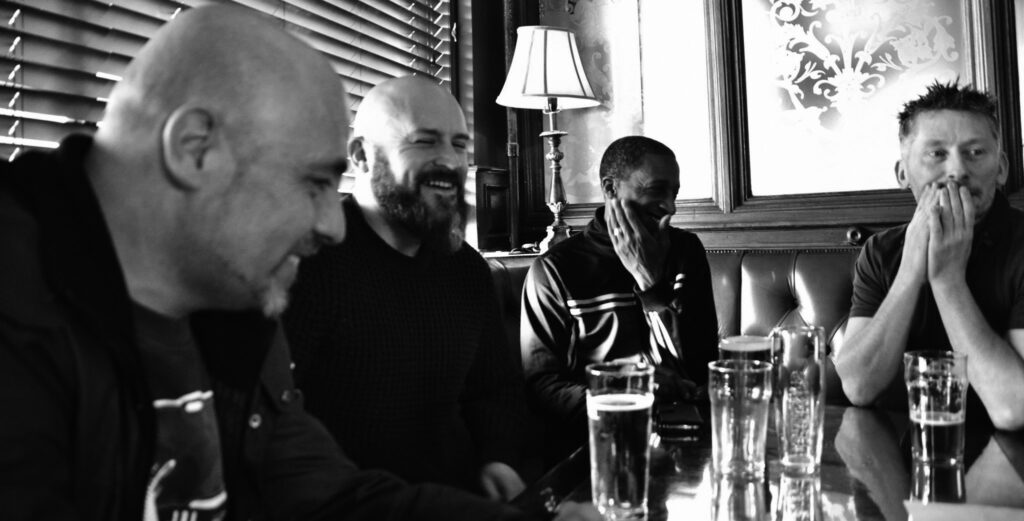
After years as a DJ and club owner running the Middlesbrough Arena, Edzy was in the habit of seeing live bands on a regular basis, primarily through the encouragement of his wife.
“I married a woman who has no interest in the music I make,” he laughs. “But she’s a big fan of live bands.”
She took Edzy to see a whole host of gigs, from acts as diverse as Everything Everything, Fleet Foxes, Dutch Uncles, Mystery Jets, Glass Animals and his favourite, the 4AD-signed Sohn. Through these nights out he developed an itch to play live himself, “to make yourself uncomfortable in front of people” as he puts it.
“It’s been a long time since I did that,” he says. “Then when you think, ‘Who do I want to hide behind on stage?’, you want your pals with you. You want some backup.”
With the team assembled, a rudimentary setlist involving work from all five members was drawn up and tested on a few willing subjects.
“A few people said they’d expect to hear this tune or that tune and they were surprised that certain tunes weren’t in it,” Edzy admits. So it was back to the drawing board to create a wall-to-wall smasher selection that left no anthem unturned.
In the meantime, the first fruit of their joint endeavor recently emerged in the shape of an LP, ‘The Adventures Of A Warped Collective’. The record is neither artist album nor compilation, but a hybrid of the two. Each member has contributed tracks and mixes, each with a nod to the early days of bleep techno and rave, but revisited with the less rudimentary production of the 21st century. Augmented by the likes of Si Begg and the Original Boy Wonder, aka former-Nightmares On Wax stalwart Kevin Harper, the new productions show the way the group is thinking.
Well, with a couple of exceptions. There’s a new mix of Rhythmatic’s 1990 classic ‘Take Me Back’ (more of which later) alongside another much-loved early Warp number, Solitaire Gee’s ‘Slumberland’, which gets a dusting off and remix treatment from LFO’s Gez Varley.
“For real,” says Gez of the project when we catch up with him through the magic of Messenger, “it’s been fun mate.”
Evidently undaunted by the prospect of taking on such a solid gold bedrock of many a DJ set, he was clearly the man for the job.
“I stripped the track down to only the vocal sample then added loads of new sounds and riffs using my Akai MPC and then bounced the sounds back to Ableton. I then went down to Mark Gamble’s studio to finish the track, adding some new chords and riffs,” he explains, matter of factly.
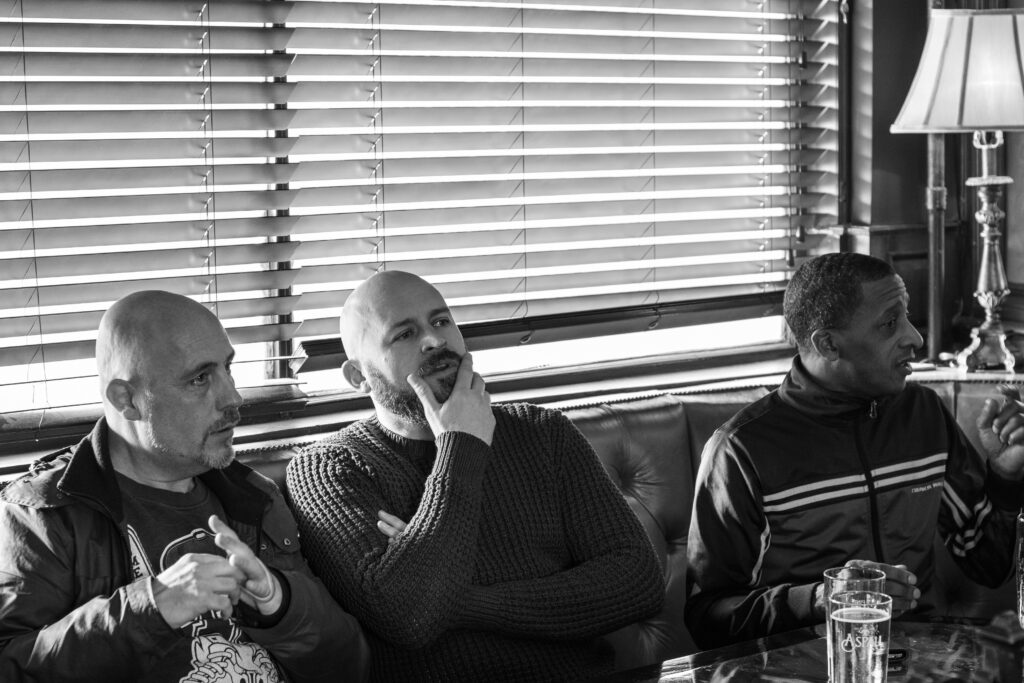
For Winston Hazel, creating his contribution, ‘Break Up’ was a revelatory experience. Having co-penned the legendary first Warp release, ‘Track With No Name’ as Forgemasters (alongside Rob Gordon, the in-house engineer at FON studios), he said he loved revisiting the “heavy bassmatic” style they all helped to create.
“It’s given me the opportunity to separate my individual contribution from the collective Forgemasters sound, and discover my own identity outside of that,” he explains. “But I quickly found that no matter how hard I tried, I will always sound a bit like a Forgemaster!”
Hazel, a key player in the development of the primitive Warp blueprint, not only as a producer, but also as a DJ (see his online archive of sets from Sheffield Community Radio pirate station if proof were needed), says that he and his fellow northern producers never set out trying to make techno specifically.
“It just ended up sounding like that,” he insists. “I have maintained the approach of seeing what comes out of a session rather than try to make a particular style. As a result, my most recent releases and remixes have ended up having a very fidgetty kind of feel to them. For me, my sound represents how I dance to music, and how I hear all the different types of music I’m into. I hope it transfers to an audience, but realistically, I can’t make music any other way.”
So much has been made of the scene’s connections with its environment – the Forgemasters name, for instance, being borrowed from the massive Sheffield steelworks that, at the time, dominated the city. We had to ask whether this music could only have been made in the north. Edzy believes it’s more a matter of social rather than geographical surroundings.
“I listened to an interview with Suggs on 6 Music where he was talking about the birth of the Two Tone movement, and there was such a similarity in his story,” he says. “I don’t think it’s about the north; we all grew up in areas of diversity where you had a West Indian family living next door to you and an Irish family two doors up. You’d walk down the back road and you’d hear some Prince Buster one minute and some Jim Reeves the next. For me, it was being lucky enough to grow up in such a melting pot of musical flavours.”
In fact, when we ask Mark Gamble (who is now based in Nottingham, but was an engineer at FON), about his time at the studio’s highly-influential mixing desk. He says its first incarnation on the edge of the city was the one where most of the magic happened, but for quite the opposite reason to the industrial stereotype.
“The original FON studio, above an old foundry on the Wicker [one of the main roads through the city centre], was an amazing place,” he remembers. “It was my first real experience in a studio. It was minimal, but we had enough toys and ideas and time to make it happen. It was amazing to hear all the classic tracks being made and seeing all the top guys of that genre just popping in. It felt like a hub of the club scene in the late 80s. I owe a great deal to that place. The studio moved to Paternoster Row, which was a beautiful and spacious place and I had more great times there, but it didn’t have the magic of the old place, it was a bit rustic and that fitted with the sound of early house.”
As well as scoring big chart success with Krush, Gamble’s other project, Rhythmatic, was also a key act in the evolution of bleep. Mark Archer, his one-time labelmate on Network Records, confesses that the possibility of getting his hands on their 1990 masterstroke ‘Take Me Back’ was a chance to take up an opportunity he missed back in the day.
“It was something I’ve wanted to do for 27 years,” he tells us. “It’s one of the tracks that was played to me before we were signed to Network Records in 1990 and hearing it alongside Neal Howard’s ‘Indulge’ and ‘Mood’ by Symbols & Instruments sealed the deal. Unfortunately all the mixes for it were already complete. It’s way different to how I’d have remixed it back then, but I wanted to make sure that it was just as dancefloor now as it was back in 1990.”
With plans for The Originators to take to the live arena in 2018 looking pretty solid, and a whole host of future collaborations also in the pipeline, ‘The Adventures Of A Warped Collective’ definitely feels like more of a starting point than a comment on the past. Edzy sees it as a way forward for these groundbreaking explorers of what has grown into an international, multi-million pound industry. It’s given them focus and allowed them to still be creative in these difficult economic times.
“We’ve cut our own throats,” he says of the desire of today’s independent musicians to be ultra-visible. They now are focused on having their music available on a plethora of platforms rather than keeping it underground and self-sufficient. But he’s convinced The Originators will survive.
“In this brand new world we’re trying to still be – not relevant, that’s the wrong word. We try to keep ourselves interested, because there are a whole load of things that could cause us to stay home. And that would be a shame.”
‘The Adventures Of A Warped Collective’ is out on Originator Sound
